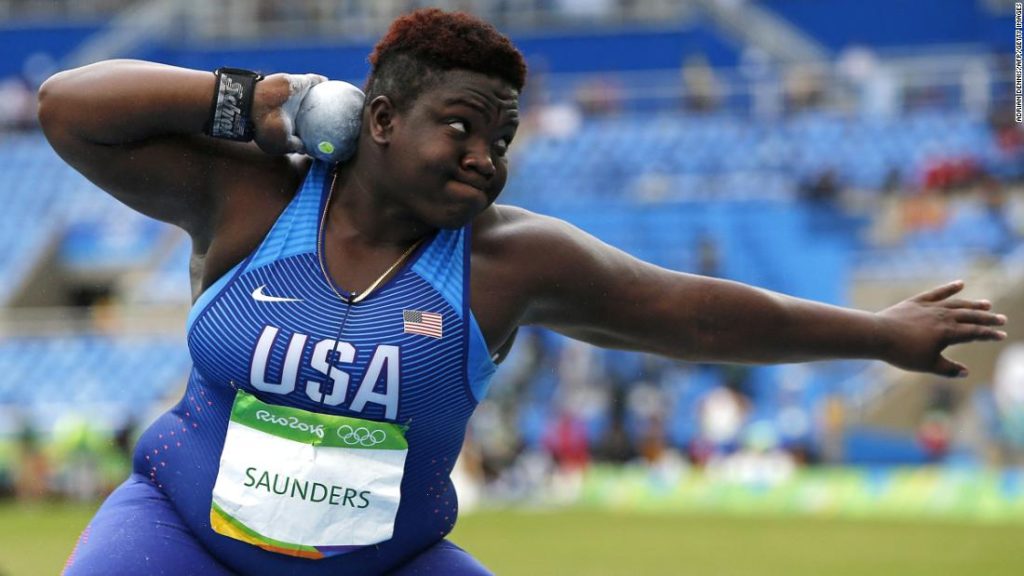As she circled past a drop-off along a Mississippi highway, the urge to veer off the road towards the towering trees below was almost overwhelming.
“It got worse and worse and worse and worse till it all boiled over … I remember in the morning, just going through the motions, kind of being in a daze, having things to do, but not really having any motivation or any care to really get anything done.
“Then hopping in my car and driving and looking at that spot.”
A few months before, Saunders had considered how the chances of survival would be slim if someone was to drive off the edge of that same drop-off she now circled past.
However, it was an impromptu text to a former therapist — “really a last-ditch effort” — that saved her life. She soon received a response, providing her with the reassurance and courage to go home and get the help she needed.
Today, Saunders is preparing for the US Olympic Trials in June. With the prospect of her second Olympics looming, she wants to “destigmatize mental health” and help others who, like her, can get caught up in cycles of depression and anxiety.
More than three years on from that day in January, she can now reflect on how her struggles as a student athlete led to her lowest moment.
“Mentally and emotionally, school was hard,” says 25-year-old Saunders.
“It wasn’t necessarily the work, because I can get the work done, but it was the pressures and stresses and all of these mandatory things that you had to do and places you had to be that for me seemed pointless, because I was there to throw the shot put.
“I got to a place where, coming back from the Olympics, I was questioning who I was. I was down because it’s like I’m being put back into this place that I don’t necessarily want to be in.”
Saunders’ depression was exacerbated by an injury heading into 2017. Despite winning the USA national championship title that year, she also lost her NCAA title and finished a disappointing 10th at the world championships in London.
When her performances dipped, so too did her broader outlook on life; it meant being at college became even more challenging.
“Track was my first love … (it) gave me that oomph to push in the environment that I was in,” says Saunders.
“I wasn’t necessarily fulfilled because being a young, Black, LGBTQ woman in America and being in Mississippi — the (most) old school of old school places that you can find in America — it was really hard going through a phase of trying to learn and find myself in a place where I didn’t fully feel accepted.
“Through all of that, that became the toughest thing. It’s like I’m trying to learn to find myself, but I can’t do that. And the only thing I have is track and then when track goes wrong, it’s like I have nothing.”
While she continues to experience depressive episodes, Saunders’ prior experiences have equipped her with tools to try to keep on top of her mental health.
She says she’s “eternally grateful” to the University of Mississippi for helping her get checked into mental health institutions at the start of 2018, and also highlights the support she’s received through therapy.
“It (therapy) helped a lot,” says Saunders, “having the time to really work on the things personally that I had been dealing with, problems really since childhood.
“It was nice to be able to have somebody that all of the weight that I’m bearing — I don’t have to carry it by myself.”
Being able to speak candidly with a close group of friends has also proved beneficial, as too has meditation.
“It gives me a chance to self-reflect and really talk to myself,” Saunders adds.
“Everyone thinks that meditation is like, ‘Oh, you have to be quiet, silent, and your mind has to be clear and free.’ And that’s totally not how I use it.
“I use it as a place of just being with myself and really accepting certain things and learning that the tough times — they pass; the obstacles — you overcome them. No matter what it is in that moment, it’s going to get better.”
Since speaking publicly about her experiences from the past five years, Saunders has been overwhelmed by the response — “it’s been support, it’s been love,” she says.
Saunders has been renowned for her strength ever since high school when he was given the nickname “Hulk,” and it was through a basketball coach that she was first encouraged to take up shot put as a teenager.
She won a state championship in her first year and went on to become an indoor and outdoor NCAA champion in college.
Aged 20 when she arrived at her first Olympics, Saunders used the experience to soak up as much knowledge as possible and learn from her more senior teammates.
She placed fifth in Rio with her final throw of 19.35m. When she returned to the US, she was greeted with a parade in her hometown of Charleston, South Carolina, as the city declared that August 17, 2016 would be Raven Saunders Day.
After undergoing hip surgery last year, Saunders set an indoor personal best of 19.57m in February — a timely performance in an Olympic year.
And outside of the throwing circle, she also feels compelled to take on another mission.
“The people that I can help, or people that are trying to get better or who are seeking help because of my personal story — it really warms my heart,” says Saunders.
“I always felt like in life, trying to reach people — to help people — is really my purpose.”
